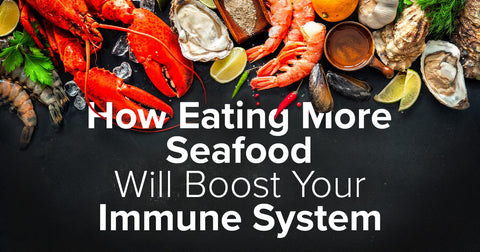Is the food you’re eating working for you? We’re not talking about just the taste. We’re asking if the nutrients the food provides are helping you stay healthy. Not all foods are created equal when it comes to providing vitamins, minerals, and other benefits we need to stay healthy. One category of food stands above the competition when it comes to healthy eating: seafood. And we’re not just saying that because we sell seafood. It’s science, baby! Studies confirm you can boost your immune system with seafood.
Research Shows Eating Seafood Boosts the Immune System
When researchers examined some of the healthiest regional cuisines in the world—Mediterranean, Japanese, and Nordic, among others—there were a few key similarities between them. One of those similarities was their reliance on seafood. An analysis by the Harvard School of Public Health (HSPH) of 20 such studies involving hundreds of thousands of participants showed that eating two or more servings of seafood each week boosted the immune system of the studies’ participants.
Many varieties of seafood contain essential nutrients that support the immune system by promoting overall health and reducing inflammation. This can help to avoid illness, recover faster when you get sick, and aid in preventing the development of chronic health conditions in the future.
The HSPH concluded that "one to two 3-ounce servings of fatty fish a week—salmon, herring, mackerel, anchovies, or sardines—reduces the risk of dying from heart disease by 36 percent."
The authors continued by describing "known or likely" benefits:
"Eating about 2 grams per week of omega-3 fatty acids in fish, equal to about one or two servings of fatty fish a week, reduces the chances of dying from heart disease by more than one-third. … Both observational studies and controlled trials have also demonstrated that the omega-3 fats in fish are important for optimal development of a baby’s brain and nervous system, and that the children of women who consume lower amounts of fish or omega-3’s during pregnancy and breast-feeding have evidence of delayed brain development."
The HSPH analysis also detailed some "possible" benefits of eating fish:
"Eating fish once or twice a week may also reduce the risk of stroke, depression, Alzheimer’s disease, and other chronic conditions."
"Eating fish fights heart disease in several ways,” the authors of the analysis explained. “The omega-3 fats in fish protect the heart against the development of erratic and potentially deadly cardiac rhythm disturbances. They also lower blood pressure and heart rate, improve blood vessel function, and, at higher doses, lower triglycerides and may ease inflammation. The strong and consistent evidence for benefits is such that the Dietary Guidelines for Americans, the American Heart Association, and others suggest that everyone eat fish twice a week."
Essential Nutrients Found in Seafood

When talking about nutrients found in seafood, many may already be aware that salmon is loaded with them, but shellfish are often overlooked as a great source for vitamins and minerals too.
Salmon
Salmon is one of the best sources of omega-3 fatty acids, which can help with inflammation and can, when consumed regularly, significantly lower the risk of heart disease. Salmon is also an excellent source of vitamin D and the antioxidant selenium, both of which support immune health.
Other types of fish with omega-3 fatty acids include herring, sardines, anchovies, halibut, rainbow trout, and tuna.
Lobster
Our company’s namesake packs a healthy dose of vitamins, minerals, and protein. Per serving of lobster (about 3.5 oz.), you get 19 grams of protein and .25 grams omega-3 fatty acids. Lobster is also loaded with vitamins and minerals, particularly vitamins B3, B6, and B12, as well as the antioxidant selenium and zinc. Zinc in particular is a natural immune booster.
Other Shellfish
Like lobster, other shellfish provide a huge amount of vitamins and minerals when consumed. Oysters contain omega-3 fatty acids, vitamin B12, vitamin D, and zinc. Crab is rich in vitamins B6 and B12, as well as selenium and zinc. And mussels provide plenty of vitamins B3, B12, and C, along with being rich in selenium, iron, and zinc.
Getting Access to Fresh Seafood

Talking about eating fresh seafood can be easier said than done. We get it. Our friends in the Midwest and the Plains states are thousands of miles from the sea, and the seafood they can get isn’t always fresh and the quality swiftly declines. That’s where we come in.
At Maine Lobster Now, we can bring the seashore to your door. We specialize in overnight delivery of fresh, sustainably harvested seafood to homes or businesses anywhere in the United States. We partner with local fishermen up and down the coast of Maine to provide us with the highest-quality seafood to send to your family.
Making lobster rolls for Father’s Day? Send a whole meal kit wherever Dad is.
Want a real traditional Thanksgiving feast with lobster (What? You didn’t know the pilgrims ate lobster during the first Thanksgiving?)? We ship live lobsters guaranteed to arrive alive, or fresh lobster meat flash-frozen to preserve quality.
Looking to get your fill of vitamins, minerals, and nutrients? Add salmon, halibut, mussels, clams, and so much more to your order.
Thanks to advancements in freezing technology, storage, and transportation, getting fresh seafood that boosts the immune system is easier than ever. If you’re looking to add a little variety to your dinner menu, choose Maine Lobster Now. When you order $100 or more, shipping to anywhere in the U.S. is free.
How to Properly Prepare Seafood
You might be hesitant to eat more seafood because you’re not sure how to cook it properly. If you need help preparing your Maine Lobster Now seafood order, please visit any of the links below for cooking instructions and recipes.
Cooking Lobster
| How to Cook Lobster Tails | How to Cook Live Lobster | Recipe: Lobster Tacos with Avocado and Lime Crema |
Cooking Crab Legs
| How to Cook Crab Legs | Recipe: Breakfast Hash (Just substitute crab meat.) |
Cooking Fish Fillets
| Recipe: Miso-Glazed Salmon with Sesame Noodles | Recipe: Seared Salt Block Tuna | Recipe: Pan-Roasted Halibut with Pan Roasted Mushrooms and Cauliflower Risotto |
Cooking Shellfish
| How to Cook Mussels | How to Cook Sea Scallops | How to Cook Steamer Clams |



